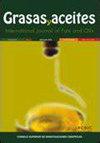地中海和亚热带气候条件下“Arbequina”橄榄品种果实中酚类物质的变异性
IF 1.1
4区 农林科学
Q4 CHEMISTRY, APPLIED
引用次数: 4
摘要
在目前的工作中,我们比较了“Arbequina”品种在四个地中海(位于安达鲁西亚、伊比利亚半岛南部)和两个亚热带(加那利群岛)的水果在整个收获期的酚含量和成分。两个地中海和两个亚热带地区采用滴灌,其余两个地中海地区采用旱地。水分有效性和收获日期对酚类含量和大多数研究组分的影响似乎比空气温度更重要。与位置相关的可变性是由于在地中海的两个地方观察到的旱地农业的高值,而其他四个地方则采用滴灌。四个滴灌地点之间几乎没有发现差异,尽管其中两个是地中海地区,另外两个是亚热带地区。此外,在收获期间,观察到酚类化合物和大多数酚类化合物的含量急剧下降。本文章由计算机程序翻译,如有差异,请以英文原文为准。
Phenolic variability in fruit from the ‘Arbequina’ olive cultivar under Mediterranean and Subtropical climatic conditions
In the present work, we compared the phenol content and composition of fruit from the ‘Arbequina’ cultivar in four Mediterranean (in Andalucía, Southern Iberian Peninsula) and two Sub-Tropical (Canary Islands) locations throughout the harvest period. Two Mediterranean and two Sub-Tropical locations were maintained with drip irrigation, while the remaining two Mediterranean locations were in dry farming. Water availability and harvest date seemed to play more important roles than air temperature on the phenolic content and most of the studied components. The variability associated with location was a result of the high values observed in the two Mediterranean locations in dry farming, with respect to the other four maintained with drip irrigation. Few differences were found among the four drip-irrigated locations, despite the fact that two were Mediterranean and the other two Sub-Tropical. In addition, a sharp decrease was observed during the harvest period for phenolic content and most of the phenolic compounds.
求助全文
通过发布文献求助,成功后即可免费获取论文全文。
去求助
来源期刊

Grasas y Aceites
工程技术-食品科技
CiteScore
2.50
自引率
0.00%
发文量
50
审稿时长
3 months
期刊介绍:
Grasas y Aceites is a peer-reviewed journal devoted to the publication of original articles concerning the broad field of lipids, especially edible fats and oils from different origins, including non acyl lipids from microbial origin relevant to the food industry. It publishes full research articles, research notes, reviews as well as information on references, patents, and books.
Grasas y Aceites publishes original articles on basic or practical research, as well as review articles on lipid related topics in food science and technology, biology, (bio)chemistry, medical science, nutrition, (bio)technology, processing and engineering. Topics at the interface of basic research and applications are encouraged. Manuscripts related to by-products from the oil industry and the handling and treatment of the wastewaters are also welcomed.
Topics of special interest to Grasas y Aceites are:
-Lipid analysis, including sensory analysis
-Oleochemistry, including lipase modified lipids
-Biochemistry and molecular biology of lipids, including genetically modified oil crops and micro-organisms
-Lipids in health and disease, including functional foods and clinical studies
-Technical aspects of oil extraction and refining
-Processing and storage of oleaginous fruit, especially olive pickling
-Agricultural practices in oil crops, when affecting oil yield or quality
 求助内容:
求助内容: 应助结果提醒方式:
应助结果提醒方式:


